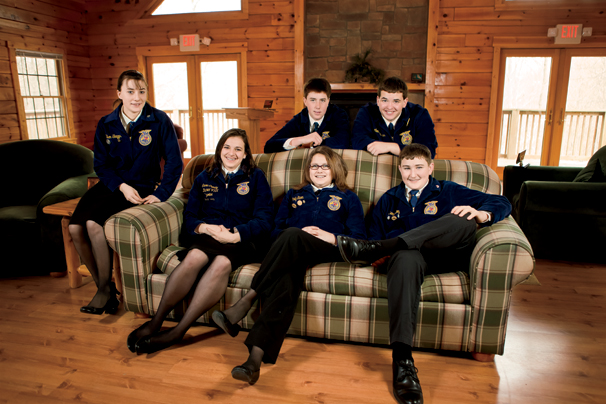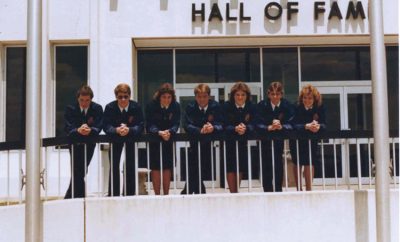Today's FFA Promotes Leadership, Career Success On and Off the Farm

Anyone who has been in downtown Indianapolis in October over the last five years has witnessed a sea of blue and gold corduroy jackets streaming in and out of the convention center and the businesses that surround it. The National FFA Organization convention and expo has been held in the Hoosier capital since 2006, bringing more than 50,000 members to the city each fall. But beyond those blue jackets, what exactly does FFA stand for?

84 Years and Still Growing
When the Future Farmers of America was founded in 1928, the organization wanted to provide agricultural education and hands-on farming opportunities to its members. Fast-forward 84 years, and while agricultural education is still the foundation of the group, now known as the National FFA Organization, it has become so much more than a club for aspiring farmers.
“We are preparing young people to become the business and agricultural leaders of the future,” explains Joe Martin, program specialist for Indiana FFA. “The organization has grown to be more than cows, sows and plows; the modern FFA is about beakers, speakers and job seekers.”
FFA provides members with agricultural education, supervised learning experiences and leadership development that have led them to careers ranging from farming and food science to genetics and biomechanics. Its goal is to promote leadership, personal growth and career success – and the formula is working: Alumni are employed in high-profile companies, and former FFA members are also active in local and federal government, including U.S. Secretary of Education Arne Duncan.
Since its inception, FFA has grown to include 7,000 national chapters, 42 state associations and 1,400 alumni affiliates. More than 8 million people have participated in the program.
“FFA alumni are leaps and bounds ahead of most college students because of their speaking and leadership abilities,” says Lucy Whitehead, national alumni program specialist for FFA. “We provide skills and experiences that are not available in traditional classrooms.”
FFA members from throughout the state learn some of those skills at the Indiana FFA Leadership Center in Trafalgar, just south of Indianapolis, where they attend camps, judging workshops and other events. “The majority of the FFA members come to the center to attend a state-organized leadership camp or a state-level contest,” says Joe Park, director of the center. “Our 168-acre campground is a beautiful facility.”

Advantages of FFA
Justin McKain grew up on a farm and knew he wanted a future in agriculture. As a high school freshman, he joined an Indiana FFA chapter in 2003. The experience had a much bigger impact than McKain expected.
“Because FFA is a national organization, I made valuable connections and developed characteristics that have helped me in my job and my life,” says McKain, now a school technology assistant in Sullivan. “I have a true passion for FFA because I’ve seen the results of being part of the organization.”
McKain wanted to ensure that other FFA alumni from his hometown would continue to spread positive messages about the organization and use their collective impact to improve their communities, so he started an alumni chapter in 2009.
“I had such a great experience in FFA and wanted to make sure that those who came up behind me had the same opportunities,” he says.
In addition to an active FFA membership and growing alumni participation, the organization also offers a select group of college students a once-in-a-lifetime experience to participate in the state officer program. Martin oversees the program in Indiana, which provides a 12-month immersive learning experience for seven college students who serve as FFA ambassadors. Their duties range from advocating for agricultural education and promoting FFA to local businesses to engaging with students in the program.
“The state officers don’t just serve as ambassadors for FFA; they are promoting the agricultural industry as a whole, reminding government officials, businesses and communities about how important it is to support local agriculture,” Martin says.
From student members and state officers to alumni and advisors, every level of FFA is active in the community.
In Indiana, chapters clean up parks or pack boxes for local food banks. Community projects, according to Martin, are a cornerstone of the FFA experience.
“We stress that community service is essential for our communities to thrive,” he says. “FFA members gravitate toward community involvement and leadership roles; they don’t just sit back and let things happen, they step up and make things happen.”













 My Indiana Home is produced for Indiana Farm Bureau members. Our mission is to connect you with the food you eat, the Indiana farmers who grow it and a rural lifestyle that is uniquely Hoosier.
My Indiana Home is produced for Indiana Farm Bureau members. Our mission is to connect you with the food you eat, the Indiana farmers who grow it and a rural lifestyle that is uniquely Hoosier.
Leave a Comment